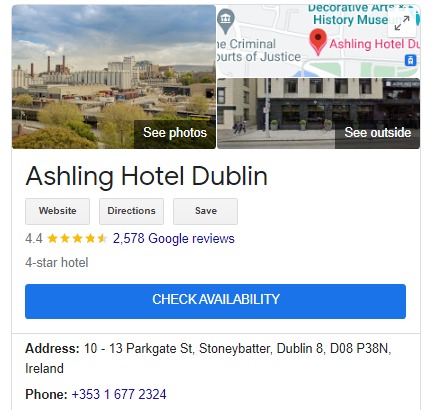Investing in your hotel’s SEO is one of the best digital marketing strategies to ensure a consistent stream of customers. While paid ads can give a boost, results show that organic traffic from search engine results still makes up a majority of a website’s total visitors.
And when it comes to making your hotel website visible online, there’s one particular SEO strategy you should focus on: local SEO.
Local SEO is a search engine optimisation strategy that helps businesses like hotels be more visible in local organic search results on Google. When looking for a hotel online, most searchers will be including a location-based qualifier in their search, like “hotel in Dublin” or “bed and breakfast in Sydney.”
For hotels, local SEO lets you determine whether a user searching for hotels in your area sees your property on the SERP. Aside from visibility, another goal is to stand out from competitors in your area.
How Google’s Local ranking algorithm works:

Google wants to show the most useful, relevant, and informative results possible to a searcher. Before we move on to specific tips to improve your hotel’s local SEO, there are a few factors that influence Google’s local ranking algorithm, according to this hotel digital marketing agency.
- Relevance – refers to how well your business profile matches the user or searcher’s intent
- Distance – how near or far your hotel is from the location term used in a search.
- Prominence – how well known your hotel is based on offline world reputation and other information Google has about your business from across the web.

Getting into Google’s map pack, which displays the top three companies the algorithm believes are relevant to one’s search, is another factor to consider. Some of the key factors that determine a hotel’s local SEO include:
- Reviews (the more positive and updated reviews you have, the better)
- Consistent Business Name and Details across multiple channels (Google My Business, Facebook and other social media profiles, Bing, TripAdvisor, and more)
- Hotel Website’s Content
- Link Profile to your Hotel’s Website
Now that you have a general idea of how a hotel’s local SEO is determined, here are 10 tips that will help you boost your local SEO strategy and make it to Google’s list of top local hotels.
1. Create a Keyword Planner
What are the keywords your potential guests are searching for? The Google Ads Keyword Planner is a free handy tool for helping you generate relevant keywords. You can get keyword ideas, including long-tail keywords, and difficulty estimates that can greatly help with your content strategy.
2. Verify your Google Business listing
Verified businesses are more likely to serve in Google’s local search results and Google Maps.
You may check if you’ve verified your business by simply searching for your hotel via Google. Under the property’s knowledge graph, click the “own this business” option. From there, Google will provide options for verifying your listing.
Once verified, you can maximize your listing’s visibility by updating the following:
- URL
- Name
- Address
- Phone
- Accurate hours of operation
- Category
- Other hotel attributes

3. Optimise your hotel’s Google My Business Profile listing
Right now, your hotel probably has a Google Business Profile listing, an excellent free tool that can significantly improve your SEO. Go check your GMB and see if you’ve fully completed your profile with accurate information about your hotel’s availability, amenities, and prices. Provide high-quality photos too to give your profile a boost on the map.
4. Keep your hotel’s crucial information accurate across all channels
Inconsistency across local listings and other channels can hurt your hotel’s local search presence and reduces the confidence in potential customers. To improve local SEO, audit your online directories and other platforms. Make sure details like URLs, business name, address, phone numbers, and hours of operation are accurate and consistent.
5. Collect reviews
Reviews are one of the top factors when it comes to local SEO ranking. Google wants to serve its client’s needs by recommending companies that get a lot of positive reviews. The challenge is, that new reviews have more bearing than old ones. To collect reviews, you may ask satisfied clients to leave reviews on your Google Business listing and other channels.
You can assign one of your staff to verbally encourage guests to leave a positive review. You may also use a CRM to automate emails asking for feedback once someone has checked out of your hotel. Lastly, include links on your website that’ll make it easy for clients to leave a testimonial.
6. Optimize Your Hotel Website’s On-Page SEO
Take it from any hotel digital marketing agency: using relevant keywords in your website copy is key to optimising your site’s on-page SEO. After determining your primary keywords based on the keyword planner, you should use them in the headline (H1) and one subheadline (H2). To optimise while avoiding keyword stuffing, it should appear about 2 times in every 100 words.
7. Create geotargeted content
Have a healthy mix of general promotional content about your products and services and genuine local content to strengthen your brand image. For instance, your blog can have posts about local events, restaurants, must-see tourist attractions, local travel tips, and other content pieces that provide value to your target market.
8. Build links on-page and off-page
Building links to your hotel’s website is another powerful local SEO strategy. Consider creating both internal and external links:
Internal linking refers to linking to a web page within your website. These internal links help Google find and determine your website’s most essential pages and what each page’s role is.
External links, on the other hand, are links pointing to an external domain. In this context, these are “backlinks” that link to your site or any of its pages/content from other websites. The more external links you have leading to your hotel’s website, the more Google will see you as a credible source of information for specific keywords.
Author Bio: Carmina Natividad is a web content writer during the day and a foodie, musician, coffee connoisseur, and plant mom when her day shift is over. She enjoys sharing her insights about blogging, web design, SEO, and other forms of digital marketing. To know more about digital marketing, check out the blogs of SPRINT DIGITAL Agency Dublin.


